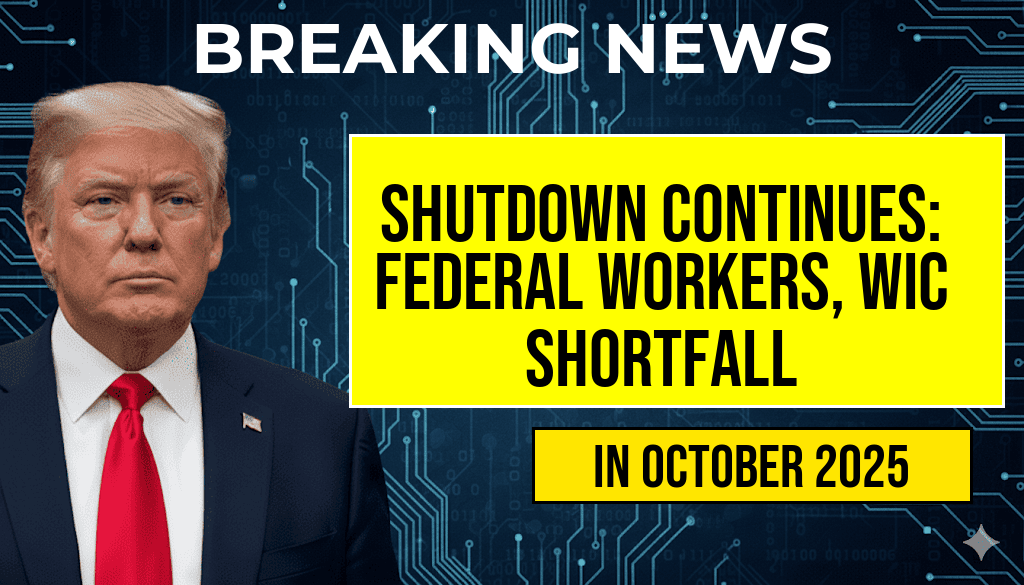As the federal government enters its sixth consecutive day of shutdown, thousands of federal employees continue to face the reality of missed paychecks, with no clear resolution in sight. Among the most vulnerable during this impasse is the WIC (Women, Infants, and Children) nutrition program, which has encountered an estimated $8 billion funding shortfall due to the ongoing lapse in appropriations. This crisis threatens to disrupt essential services for millions of vulnerable families across the country, raising concerns among public health advocates and policymakers alike. With many federal agencies operating under limited or no funding, the shutdown underscores deep partisan divisions over budget priorities and immigration policies, leaving critical social programs in limbo.
The Impact on Federal Employees and Social Programs
As the shutdown stretches into its sixth day, an estimated 800,000 federal employees remain furloughed or working without pay. Agencies such as the Department of Homeland Security, the Treasury, and the Internal Revenue Service have either reduced operations or halted services altogether. Employees are anxiously awaiting congressional action to reopen government functions, but political disagreements have hampered negotiations.
Meanwhile, programs that serve the nation’s most vulnerable populations are experiencing severe disruptions. The WIC program, which provides nutritional assistance to pregnant women, new mothers, infants, and young children, is facing a significant funding shortfall estimated at $8 billion. This shortfall jeopardizes access to vital resources for nearly 6 million women and children nationwide, many of whom rely solely on WIC benefits for their nutritional needs.
WIC Program Faces Funding Crisis Amid Government Shutdown
The WIC program is administered through a combination of federal and state funds, with the federal government providing a substantial portion of the budget. However, the shutdown has halted new allotments and processing of benefits, leading to concerns about service continuity. State agencies have begun issuing notices to participants, warning of potential disruptions, including delays in benefit issuance and difficulty in replenishing supplies.
Officials warn that prolonged funding gaps could cause a ripple effect, including:
- Reduction in food packages and nutritional support services
- Delayed or canceled appointments for prenatal care and child health screenings
- Increased food insecurity among vulnerable families
Public health experts emphasize that interruptions to WIC services could have long-term consequences, particularly for infants and pregnant women who depend on consistent nutritional support during critical developmental periods.
Political Deadlock and Its Broader Consequences
The shutdown reflects entrenched political discord over broader fiscal issues, including disagreements on immigration policies and government spending priorities. While some lawmakers advocate for a temporary funding measure to reopen agencies, others demand concessions on immigration enforcement and border security, complicating negotiations.
According to the Fiscal Year 2023 appropriations bills, many essential programs have been affected, with the WIC funding shortfall exposing the fragility of social safety nets amid political impasses.
Impact on Federal Employees and Public Services
| Area Affected | Details |
|---|---|
| Federal Employees | Approximately 800,000 furloughed or working without pay; essential workers continue but with limited resources |
| Public Services | IRS tax processing delays, passport processing backlogs, reduced security operations at airports |
| Social Programs | WIC, SNAP benefits at risk, delays in processing applications for housing and health assistance |
Responses and Next Steps
Lawmakers from both parties have expressed concern over the ongoing shutdown’s impact but remain divided over solutions. Some members of Congress have called for immediate funding measures to reopen the government and sustain vital programs like WIC, while others seek broader policy concessions.
Federal agencies are attempting to mitigate some effects by reallocating existing funds and prioritizing essential services, but these measures are temporary and insufficient to address the long-term needs. Advocacy groups are urging Congress to pass a clean funding bill to prevent further harm to vulnerable populations.
As negotiations continue, public health advocates warn that delays in nutrition assistance could exacerbate health disparities among low-income families, particularly those with infants and pregnant women. The situation underscores the urgent need for bipartisan cooperation to resolve fiscal disputes without jeopardizing essential social safety nets.
For ongoing updates on the government shutdown and its impacts, readers can follow coverage from reputable sources such as NPR and CNN.
Frequently Asked Questions
What is the current status of federal employees during the shutdown?
Federal employees are currently facing a lack of paychecks as the government remains shut down on the sixth day, affecting various government operations and services.
How does the shutdown impact the WIC program?
The Women, Infants, and Children (WIC) program is experiencing a funding shortfall of $8 billion, which threatens to disrupt essential nutrition assistance for vulnerable populations.
What are the reasons behind the government shutdown?
The shutdown is primarily due to a funding impasse in Congress, preventing the passage of a budget or continuing resolution to fund federal agencies and programs.
Are there any efforts to resolve the funding crisis?
Lawmakers are engaging in negotiations to reach a funding agreement, but no resolution has been announced yet, leaving many federal programs and employees in uncertainty.
What can affected individuals do during this shutdown?
Federal employees should stay informed through official channels and may need to prepare for financial uncertainties. Those relying on programs like WIC should seek updates from local offices about potential disruptions.






